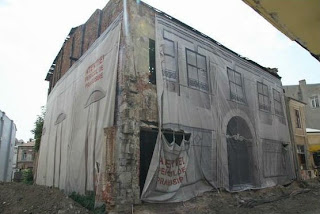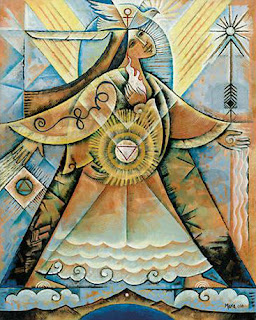 |
| Art by Angela Treat Lyon |
There is solid evidence for the fact that when women speak more than 30 percent of the time, men perceive them as dominating the conversation; well, similarly, if, say, two women in a row get one of the big annual literary awards, masculine voices start talking about feminist cabals, political correctness, and the decline of fairness in judging. The 30 percent rule is really powerful. If more than one woman out of four or five won the Pulitzer, the PEN/Faulkner, the Booker—if more than one woman in ten were to win the Nobel literature prize—the ensuing masculine furore would devalue and might destroy the prize. Apparently, literary guys can only compete with each other. Put on a genuine equal competitive footing with women, they get hysterical. They just have to have their voices heard 70 percent of the time. —Ursula Le Guin The Wave in the Mind (Off the Page: Loud Cows; pages 119-120).
__________________________________________________
RESOURCES FOR HOW TO CREATE A PODCAST
Cost: I'm assuming you've got a computer with internet connection, so the only other costs to start up your podcast are a headset with microphone (about $30) and the Pamela software (also about $30), if you want to record multiple voice conversations. Depending on how much your headset costs, you'll spend $55-$70 total to start your podcast. Everything else is FREE.
Record & Edit:
- Audacity: In addition to recording, you can also cut sections out, amplify sound, have multiple tracks that fade in and out of each other, remove noise, etc.
- Skype: Allows you to interview long-distance for free, as long as you both have a Skype account. You can have regular two-person conversations or whole groups.
- Pamela ($32.41): Allows you to easily record panels from Skype. They have a free version, but it only allows you to record for 15 minutes at a time. I recommend the Professional version, which also gives you a free trial so you can see if you like it.
- Levelator: Equalizes the "loudness" of each voice in a conversation. Great for interviews and panel discussions.
- Kevin MacLeod: He puts his music in genre groups and allows for free use and modification as long as you attribute.
- Dropbox: Lets you collect and share files.
- Archive.org: Free public hosting with easy user interface; also increases how you can be found online. There are listeners who found this podcast through Archive.org.
- Blogger.com: Free and easy to set up quickly.
- iTunes FAQs for Podcasts: As soon as I put up my podcast, it seemed like everyone wanted to know when it would be on iTunes. To set up your podcast on iTunes, you need your feed url. Here's the feed url for this podcast that iTunes finally accepted: http://daughtersofmormonism.blogspot.com/feeds/posts/default?alt=rss

















